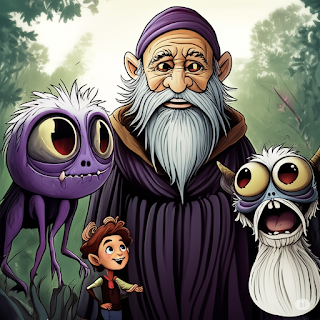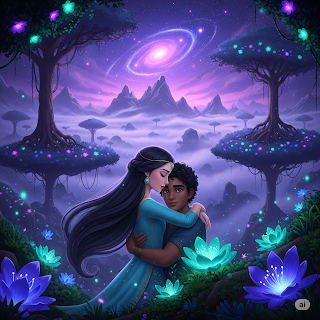The village of Silent Valley lay curled between two dark hills, as if hiding from time. Mist clung to the rooftops like secrets left unsaid. The wind there did not howl—it whispered, carried rumors like leaves, and shivered the bones of anyone who dared listen too closely.
In the lowest corner of this forgotten place lived Salim, a boy of the earth. He wore the same patched tunic every day, his bare feet calloused from stone and frost. His home was a crumbling hut, his only inheritance a reed flute and a name no one remembered. But his eyes burned with something the rich could never buy: wonder.
He first saw Laila on the balcony of the stone manor during the Harvest Festival. She stood surrounded by silk and servants, her face lit by lanternlight and boredom. Her dress shimmered like water under the moon. Her gaze wandered over the crowd until it paused—on him.
Their eyes locked. He looked away, ashamed. She smiled.
That night, he wandered back to the manor walls. To his disbelief, she was already there—alone beneath the fig tree that reached over the boundary like a curious hand. He froze, heart racing. She beckoned him closer.
“You stared at me like you’ve seen a ghost,” she whispered.
“No,” he said. “Like I saw the sky for the first time.”
Night after night, they met in secret beneath that same fig tree. Sometimes she brought warm bread, sometimes poetry. He brought stories, his flute, and wildflowers clutched like offerings. Their worlds collided in whispers and laughter, stolen glances, and trembling fingers brushing in the dark. They never kissed. Not yet. But every heartbeat between them felt like thunder.
The village slept, but their souls danced.
But the shadows were listening.
One night, a servant saw a shape in the trees. Another night, Laila’s father found her bed empty and a flower—filthy, wild—pressed between pages of her journal. Rage consumed him.
“They’ll call us shame,” he thundered.
Laila was locked in the East Tower. Salim was caught by guards, beaten, and dragged through the streets like a stray dog. Bloodied, broken, and cursed, he was banished with nothing but his flute.
Weeks passed. Wounds turned to scars. Laila wept behind her barred window, dreaming of fig trees and freedom. One stormy night, she broke free, climbing down a soaked bedsheet. She ran barefoot, dress torn, face streaked with rain and defiance. She found Salim hiding in the hills. They embraced like two dying stars finding each other at the edge of a black hole.
They didn’t speak. They ran.

Deeper into the forest, deeper than any map dared to go. Thunder cracked the sky, trees bent as if mourning. Then the ground trembled. Beneath an ancient oak, a circle of black stones pulsed with eerie light. The wind spoke in tongues. Salim reached for Laila’s hand—and the earth swallowed them whole.
They awoke in a world that wasn't a world.
The sky bled violet. Mountains floated in silence. The grass hummed. Creatures walked slowly and blinked with sideways eyes. Some spoke in riddles, others sang in colors. A three-legged beast wept near a pool that reflected memories instead of faces. Trees grew upside down. Night never ended.
They wandered in awe and horror. The laws of time crumbled. Salim began to dream while awake. Laila once touched a flower and felt every pain she’d ever hidden.
But the people—if they could be called people—welcomed them. One was a horned child who gave Laila a stone that pulsed like a heart. Another was a blind woman with feathers for hair who told Salim:
> “You came here fleeing death, but death is part of you now.”

They lived among the Forgotten Ones for what may have been years or only moments. They learned to speak in silence, to listen to roots, to forget what pain meant—but not love. Their bond, despite the madness of this place, only deepened. They were no longer poor or rich, high or low. Just two beings lost together in a world that had forgotten cruelty.
One twilight, as Laila danced barefoot in glowing dust, a winged elder approached them.
“The war has ended,” it said, voice trembling like candlelight. “Your world bleeds but breathes. You may return, if your hearts remain whole.”
And so they stepped back through the veil, holding each other.
But the village... the village was ash.
Silent Valley had burned. The manor was a skeleton of stone. Fields were black veins on the land. War between the rulers and the starving had devoured everything. No birds sang. No children cried. Only silence greeted them—heavier than death.
Laila fell to her knees, sobbing. Salim held her close, eyes hollow. The tree—their fig tree—was gone.
But they stayed. They dug. They built. One wall. Then another. A neighbor, limping and soot-covered, returned. Then another. Then the children came back, led by hunger and memory. Together, they rebuilt—not for lords, not for bloodlines—but for l
In the center of the new village, they planted a fig tree.
And under its shade, years later, Laila and Salim stood with garlands in their hair and tears in their eyes, as the villagers cheered.
They kissed
The world didn’t end. It had already ended—and begun again.
In the wind, if you stand quiet enough, you can still hear Salim’s flute—playing for the ghosts, the lovers, the broken-hearted, and those who dared to rebuild from ash.
The End.














تعليقات
إرسال تعليق